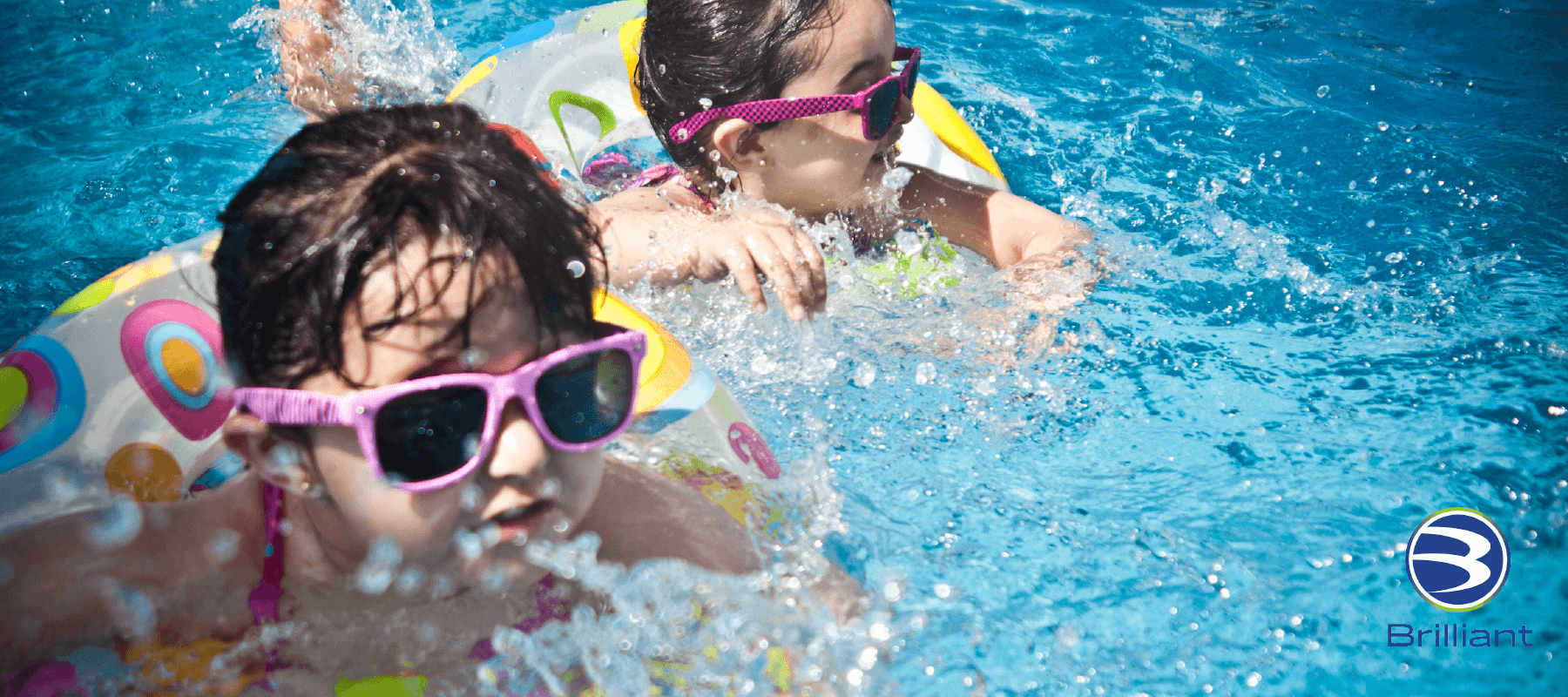- Phone: 1.404.373.4030
- Opening Hours: Mon-Fri 9AM-5PM Eastern

The weather is warm, school is out, sun is bright, time for summer fun! One of the biggest concerns for parents in these summer months is making sure our child’s skin is protected from the harmful UV rays of the sun. And there is no more annoyance to a child than being ready to run outside and play and be stopped in your tracks by a parent insisting on slathering on the sunscreen! They may hate it now, but studies have shown the sunburns received in childhood can contribute to skin cancer later in life! The biggest challenge as a parent is wanting to be outside to watch your older kids when you have a baby to take care of and protect from the sun, both from the UV rays to their skin AND protect their body from the heat. Sun protection and safety becomes your #1 summer priority, for their protection and your peace of mind!
The UV rays of the sun are strongest between 10 a.m. and 4 p.m., if you can avoid being outside during these hours that offers protection to baby’s skin from sun exposure. The American Academy of Dermatology recommends to keep your baby in the shade, especially babies under six months of age, this is the best practice for their well being during the summer months. If shade is not available, create your own shade by using an umbrella or pulling up the hood on your stroller. Dress your baby in lightweight clothing that covers their arms and legs and always make sure they have a hat to cover their head, with a brim for shade on their face. If they will keep them on, sunglasses will help shade their eyes from the glare of the sun. Sun safety and protection is also required on cloudy days where the sun’s rays can still penetrate the clouds and potentially burn their delicate skin.
Sunscreen is not recommended for babies under six months of age, but if you have to be out with your young baby in the sun you can apply a small amount of sunscreen to exposed areas of their skin. The American Academy of Pediatrics suggests you look for a sunscreen that has an SPF of AT LEAST 15 and also has the words “broad-spectrum” on its description. This term means that this particular sunscreen will offer protection for their skin against ultraviolet B (UVB) and also against ultraviolet A (UVA) rays. UVB rays are the ones known to cause skin cancer and most sunburns. Again, the effects of sunburn during childhood raises the risk of melanoma (skin cancer) later in life . Make sure the brand of sunscreen you buy also says water-resistant and contains zinc oxide. Remember to reapply sunscreen to their skin every two hours or after your child has been in the water, sweating or you have been drying them off with a towel. Stay away from purchasing sunscreen brands that have the chemical oxybenzone. This chemical can have hormonal properties that are not safe for babies and young children. It’s always best to test a small area of your child’s skin to make sure they are not allergic to the sunscreen you are planning to use. Sunscreen may not be recommended for babies under 6 months of age, but it is a necessity for those over the age of six months! It’s the best protection for their skin while exposed to the sun.
Sunscreen is effective protection for the skin from the sun, but it can’t protect your child from the heat. Sun safety is also critical protection for babies because they can become overheated which could potentially lead to heat stroke. BabyCenter.com reports the best way to avoid heat stroke for your baby is to make sure you dress them in light, loose-fitting clothing. Always make sure to keep your baby in the shade whenever possible, for sun exposure and heat related reasons. Before you put your baby in the car to go somewhere, crank the car and cool down the temperature inside. Always offer your baby plenty of liquids so they do not become dehydrated (breast milk or formula is enough to hydrate them, pediatricians don’t advise you to give water to babies until they reach 6 months of age). For families that don’t have air conditioning in their homes, find public, air-conditioned places to visit during the hottest hours of the day.
Babies and children will experience negative reactions to heat when there is a case of high temperatures outside and conditions of high humidity. These related incidents are made worse when outside work and or playing sports are added to these hot conditions. Children don’t think about becoming dehydrated, but the intensity of the heat and sweating paired with not enough fluids, increases the risk of heat related conditions. Babies are at an elevated risk because they haven’t yet developed the ability to sweat like older children and adults. Vacations to tropical climates also see a rise in heat related health issues because the body is not accustomed to such high temperatures. If you are taking babies and young children to a hotter climate than they are used to, make sure to keep them fully hydrated and take them inside for frequent breaks where there is air conditioning. The protection you implement now will teach your child good habits for the future!
Limiting sun exposure for babies and young children is the best safety protection for their skin from the sun and the heat of summer. It will take careful planning and action on your part, but with these careful measures in place, babies can still enjoy the outdoors with you and make this a summer to remember.
Safety for your child is not just a seasonal issue, it’s a day in, day out, minute by minute necessity. Baby Buddy, part of Compac Industries, a family owned business based in the USA, offers many high quality products to help you take care of your baby and keep them, and their everyday items safe and sound.
Check us out: https://shop.compacind.com/baby-buddy-c2.aspx
© 2020 Compac Industries. All rights reserved.
This article is intended to provide an understanding of and knowledge about “health topics” as expressed through the perspective and research of the author. It is not intended to be a substitute for professional advice or counsel, including the diagnosis or treatment of any condition. Always seek the advice of your qualified healthcare provider with any questions you may have regarding a medical condition, illness or treatment of any listed or non listed situation above. By using this site, you signify your assent to our Terms and Conditions.


DISCLOSURE: Noelle Copeland RDH is an Oral Care Specialist and Dental Consultant who provides content

DISCLOSURE: Noelle Copeland RDH is an Oral Care Specialist and Dental Consultant who provides content

We believe that all people are fearfully and wonderfully made and designed in the womb for a grand purpose.
Useful Links
Copyright © 2023 Compac Industries | All Rights Reserved.